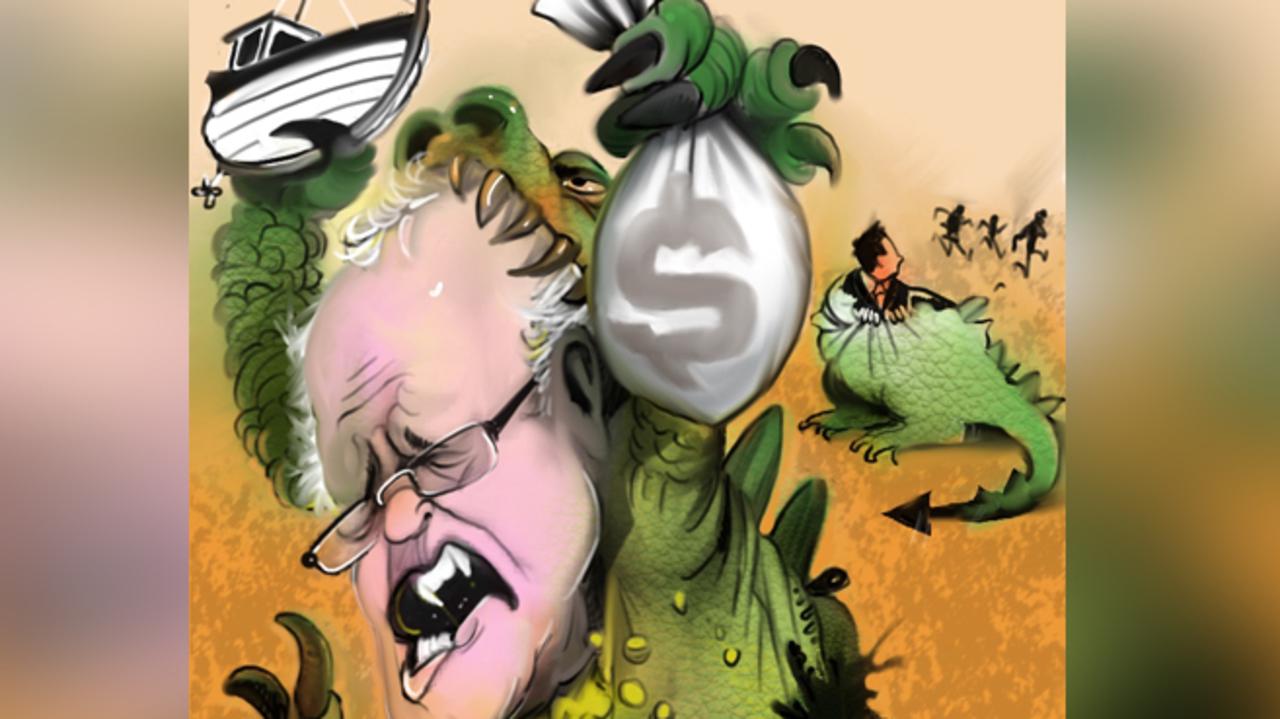Bill Shorten’s lesson in leadership

It took two sobering polls for Bill Shorten to realise what should have been obvious from the beginning: after wading fully clothed through their blood, serial killers of prime ministers are surely the last people on the planet who should publicly emote on the leadership conflicts of their opponents. The tiniest dose of common sense, or plain old self-interest, should have told him to shut up, stay out of it and leave it to the media and Liberal MPs.
Yet there he was calling out “yoo-hoo, over here guys” so he could convey his concern or outrage about the effects of the guerilla war on the Liberal Party, not to mention the impact on the Australian psyche of witnessing another prime minister being cut down by his own.
Nobody believed it was genuine. Everybody could easily imagine the whoopin’ and a-hollering going on behind closed doors.
If the Opposition Leader had to appear at all, it should have been only to contrast what he was proposing versus what the government was proposing. As he hasn’t produced much, that would have been difficult.
So, again, he should have just stayed quiet. This was a lesson learned the hard way by Labor MPs who also have witnessed or participated in more than their fair share of purges. One of them was moved to quote Napoleon: never interrupt your enemy when he is making a mistake. He used to tell Kevin Rudd that, too, and he never listened either.
Finally the message filtered through to Shorten that it was time to produce something other than phony hand wringing. Two polls did it. The first, Newspoll, published in this paper almost two weeks ago, showed the Coalition had picked up; then on Monday the Fairfax Ipsos poll confirmed it. Shorten raced out, skating over the thickest ice he could find to release a policy designed to force multinationals to pay more tax. Business dismissed it as anti-jobs and anti-investment. That’s akin to a tick for today’s Labor.
Shorten and his Treasury spokesman Chris Bowen hopefully are working up a thoughtful, constructive response to today’s Intergenerational Report. However, Labor insiders caution that will happen only if there is a thoughtful, considered exposition of the problem from Joe Hockey.
The Treasurer gave Coalition backbenchers a taste on Tuesday. A few, including Peter Hendy, Tony Smith and David Gillespie, offered up ideas on how the presentation might be improved, but were largely positive about Hockey’s presentation.
It didn’t stop them thinking about the absurd sequence of events that has exacerbated the government’s problems.
The dumping of the Medicare co-payment, a relic of the last budget, served only to highlight the importance of the Intergenerational Report to the selling of the next one. The report on demographics used to be an aficionados’ guide to the future. It has never been used before to launch a budget or refloat a government, so there is enormous pressure on Hockey as well as Abbott to ensure that it does the job.
Hockey sought to downplay the intergenerational report and the budget yesterday by saying it was not the “be-all and end-all” of economic action. Strictly speaking that’s true. However, Liberal MPs know how much is at stake: their survival as a government, their survival as individual members of parliament, the survival of Abbott as Prime Minister. No one, on either side, can recall a situation where an Australian leader of a major political party has managed to recover from events such as those we have witnessed recently. Malcolm Fraser survived a challenge from Andrew Peacock but then lost the subsequent election to Bob Hawke.
They also remember the false dawns of poll swings back to incumbents after catharsis: John Howard after the Asia-Pacific Economic Co-operation forum summit madness in 2007; Julia Gillard after beating Rudd in 2012. Despite what senior Liberal figures say publicly, despite the daily ditching of unpopular policies, few believe Abbott will lead them to the next election. What some, particularly in the Right, are desperate to avoid as they plead for more time for Abbott is a return of Malcolm Turnbull.
What is happening therefore is not so much a campaign to save Abbott but to block Turnbull. There are about a dozen hard-core Liberals inside and outside cabinet who are members of the Anybody But Turnbull faction.
The desire of this dirty dozen for Abbott not to fail is exceeded only by their desire that Turnbull never succeed. The longer the next climax can be delayed, the better the prospect Abbott can be saved and, if not, that an alternative to Turnbull as most likely successor will emerge. Turnbull is working hard to minimise the perceived philosophical differences between himself and Abbott, nominating same-sex marriage as the key one. There is also the small matter of the republic.
Julie Bishop remains prominent, but Scott Morrison has been inserted front and centre into the economic debate through his new portfolio of social services. Morrison, first nominated as a future leader in this column as far back as April 2010, is fulfilling his potential. He showed at the National Press Club last week that he is the sharpest performer of the lot.
However, as the youngest and the least experienced, his growing band of admirers fear he would be burned, much as Gillard was, if he were brought on too soon.



To join the conversation, please log in. Don't have an account? Register
Join the conversation, you are commenting as Logout